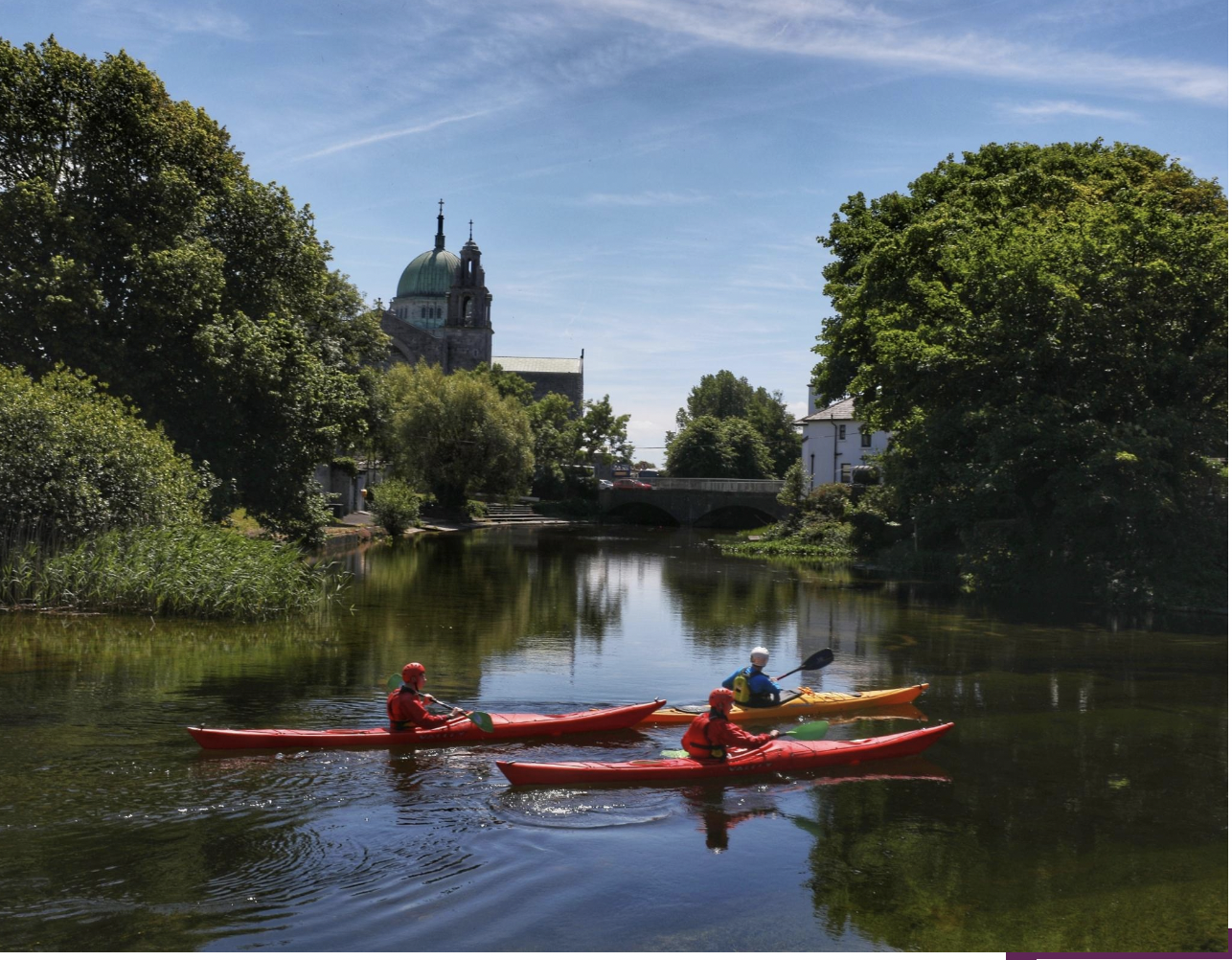
Our value of sustainability comes most strongly from our students. This generation faces climate change most vividly. Our students demand that we leave the world in a better place than they found it. In our research, teaching and engagement, and in our actions, we are committed to being an exemplar of climate action.
This is a responsibility of us all so we work with our communities and partners to achieve this.
This year, University of Galway was identified as Ireland’s number one university for Sustainable Development by the Time Higher Education’s Impact Rankings. Below, Sustainability Officer Michelle O’Dowd Lohan recounts the University’s sustainability journey so far, and its goals for the future.



As a university community, University of Galway is aware that life on our planet is at risk from unsustainable interactions between our societies, economies and our environment. We recognise the critical role that universities must play in educating the next generation of citizens for a sustainable society and delivering knowledge and innovation to transform society. Through our learning and research activities, and as signatory to the United Nations (UN) Sustainable Development Goals (SDGs) Accord, we are driving the transition towards a more sustainable future.
Much of our sustainability work is driven by the Community University Sustainability Partnership (CUSP), which comprises working groups organised around six key themes: Research & Learning, Energy & Greenhouse Gas Emissions, Nature & Ecosystems, Health & Wellbeing, Built Environment & Governance and Leadership. Our Learn-Live-Lead approach to sustainability places students at the heart of the sustainability journey, promoting sustainability scholarship, environmental stewardship and global citizenship as key student attributes.
University of Galway launched its first Sustainability Strategy in 2017. Much has come about as a result of this first strategy. We appointed our first Sustainability Officer in 2019, became an An Taisce Green Campus Ireland awarded site and began managing the campus in line with the All-Ireland Pollinator Plan. Other major milestones reached include; exceeding the Public Sector 2020 Energy Efficiency target of 33% reaching the university target of 40% in 2020, receiving the first Green Lab Certification in Europe and thanks to our university’s collective approach to delivering sustainable societal impact, academic staff have embraced sustainability as part of their curriculum and research endeavours.
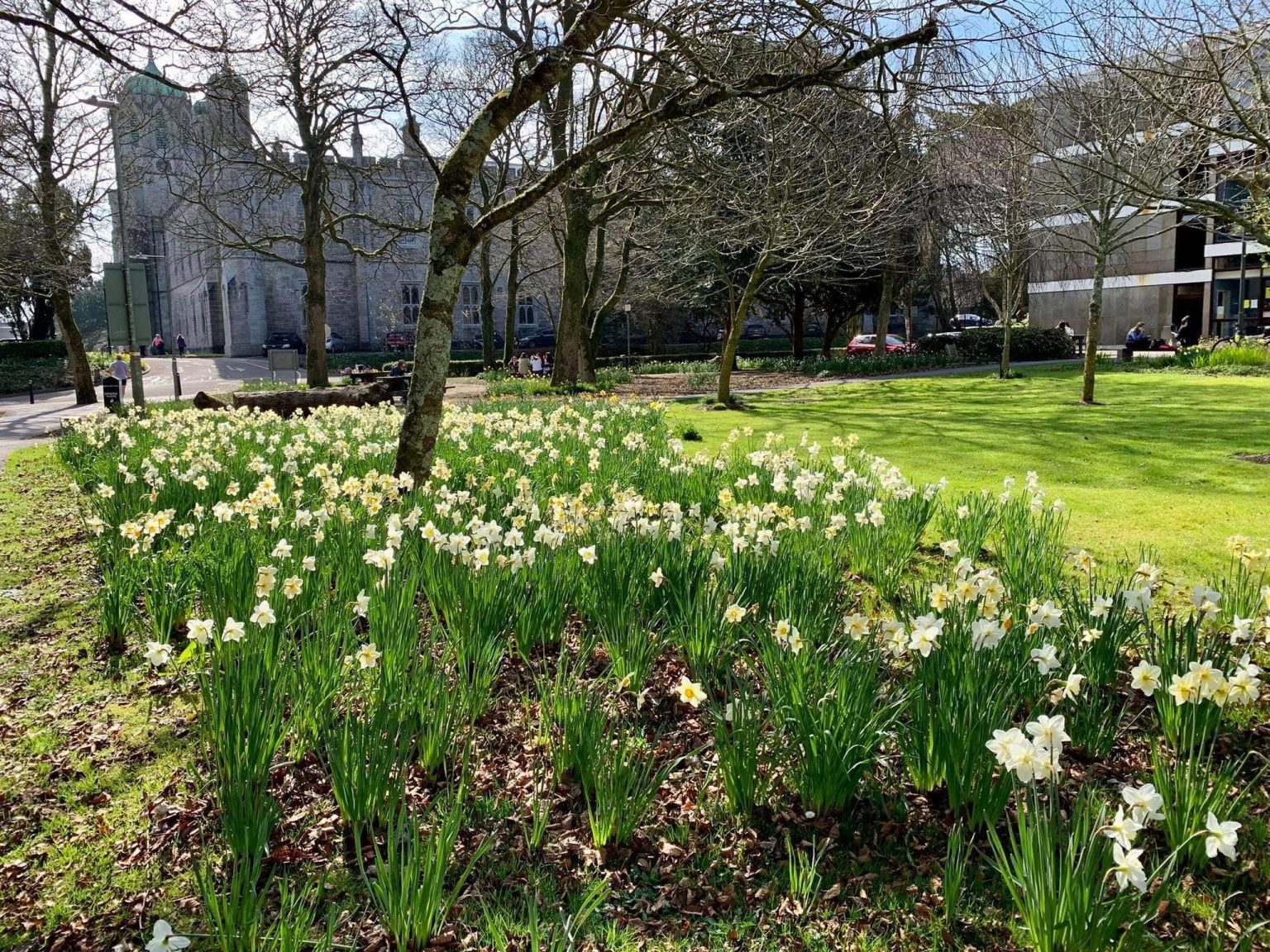
A year-long consultation process helped build our second sustainability strategy which sets out our vision and commitment to be a leader in the transition to a sustainable future and embed sustainability in our culture, operational policies and governance structures and empower our communities to be champions of sustainability. The Strategy was launched by Dr Mary Robinson, former president of Ireland and former UN High Commissioner for Human Rights, on 9 March 2021.
Progress on the delivery of our second sustainability strategy has been brisk and impactful. Our University Management Team agreed a new sustainability governance framework and an ambitious Climate Action and Sustainability Policy. We continue on our journey towards great energy efficiency; the Sustainable Energy Authority Ireland (SEAI) Annual Report 2021 on Public Sector Energy Efficiency Performance highlights our 54.2% energy savings since the baseline year. Our inaugural Carbon Footprint Report, Travel Survey Report 2022 and Waste Characterisation Report 2022, together, provide us with valuable data to actively engage the campus community and determine the action needed to reduce our emissions.
In November 2021, University of Galway joined an elite group of 133 universities across the world by being recognised with a STARS Gold rating for its sustainability achievements. The rating was achieved following a review by the Association for the Advancement of Sustainability in Higher Education (AASHE) under its STARS rating system. In addition, University of Galway is listed as a top performer in the AASHE 2022 Sustainable Campus Index. University of Galway’s rank of first place in Ireland and 47th in the World in the Times Higher Education (THE) Impact Ranking 2022 is a further testament of our sustainability progress on the world stage. The ranking also puts University of Galway as the fifth best university in the world for Sustainable Development Goal 12 – Responsible Consumption and Production.
As a signatory to the SDG Accord, University of Galway continues to fulfil its commitment to ‘share our learning’ and ‘account to both local and global communities our progress toward the SDGs’ with 3 of our case studies featuring in the international EAUC SDG Accord Annual Report 2022. Furthermore, the University’s approach for progressing the SDGs features as a case study in Ireland’s Second National Implementation Plan for the Sustainable Development Goals 2022 – 2024.
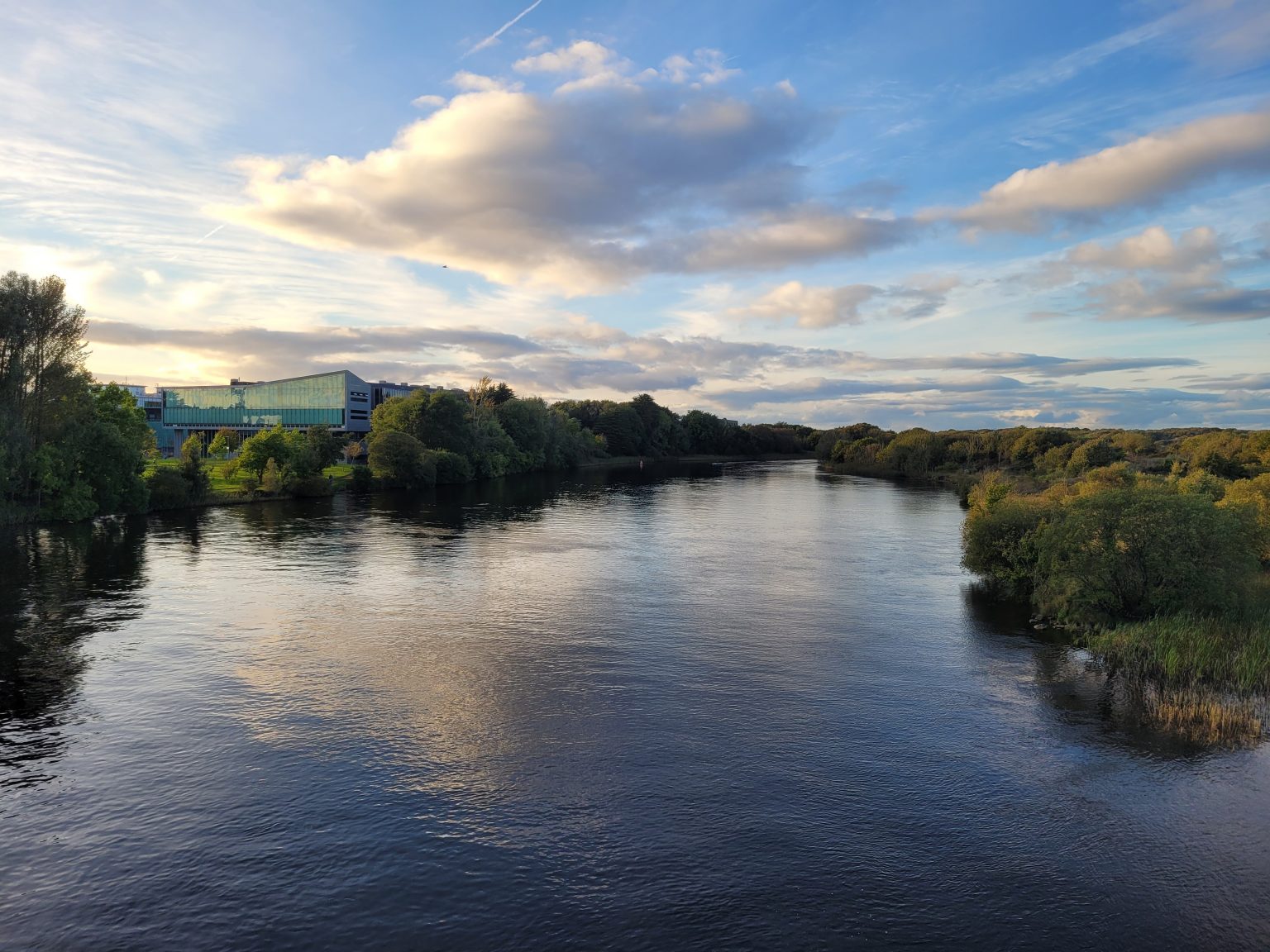
As part of University of Galway’s fight against climate change, it’s been an exceptional year for the Energy Team, delivering numerous initiatives that have enabled the University to exceed the targets set out in the University’s Sustainability Strategy 2020-2025.
As a public body, University of Galway has been mandated to reduce energy by 15% across the campus, as part of measures announced by the government. The President Ciarán Ó hÓgartaigh has set up a working group to manage the challenges around energy reduction focusing on areas of Operations, Research and Behaviour. Plans for the first all-campus energy audit of equipment across all laboratories, research spaces and offices are underway, which will allow us to establish a baseline of energy used outside of daily operations energy usage. The challenge of reducing energy through changes in behaviour will be focussed on targeted information and awareness, raising campaigns and publishing of live energy data, linking in with the ReduceYourUse campaign led by Sustainable Energy Authority of Ireland (SEAI) and Government.
Head of Building Services, Energy and Utilities at University of Galway, Michael Curren, says “In operations, the team has successfully completed the handover of the first major decarbonisation project on campus. Áras de Brun is part of the SEAI/Higher Education Authority (HEA) Pathfinder Pilot program, with a particular focus on the challenges of decarbonisation of heat, maximising energy and achieving significant carbon reduction. The works included the installation of a new 205kw Air to Water heat pump; a 3,000 litre buffer vessel; a state-of-the-art Building Management System; new radiators and thermostatic radiator valves; and replacement of LED lighting and controls throughout the building.”
The Áras de Brun project will serve as a living laboratory, enabling IRUSE researchers to monitor and report on the findings from the newly installed technologies and to translate these findings through their course curriculum. Masters students in Energy have been working with the design team generating Integrated Environmental Solutions (IES) simulation models and data sets for the project, allowing the students to monitor data for the next two years and develop real world strategy models with the operations team.
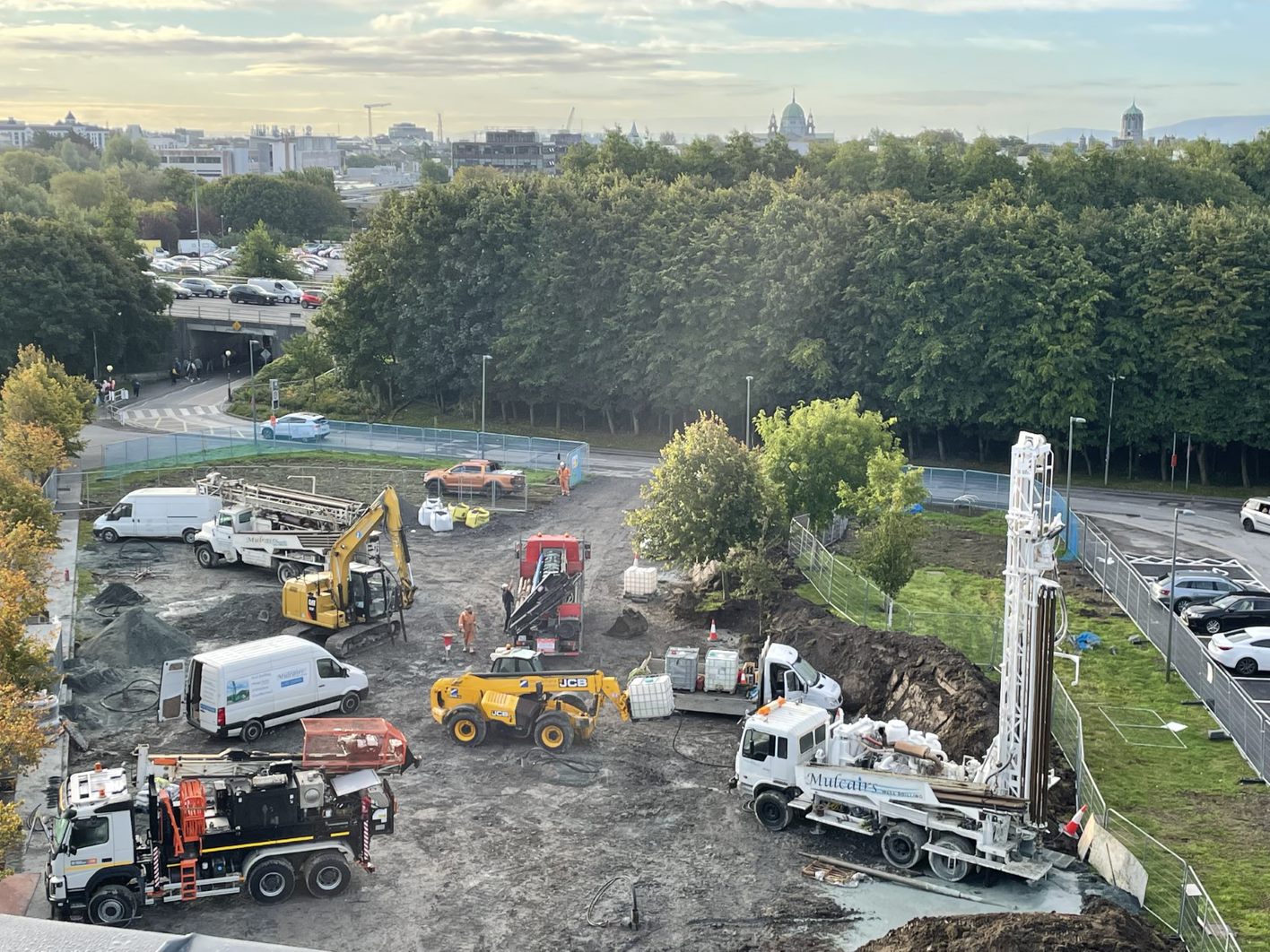
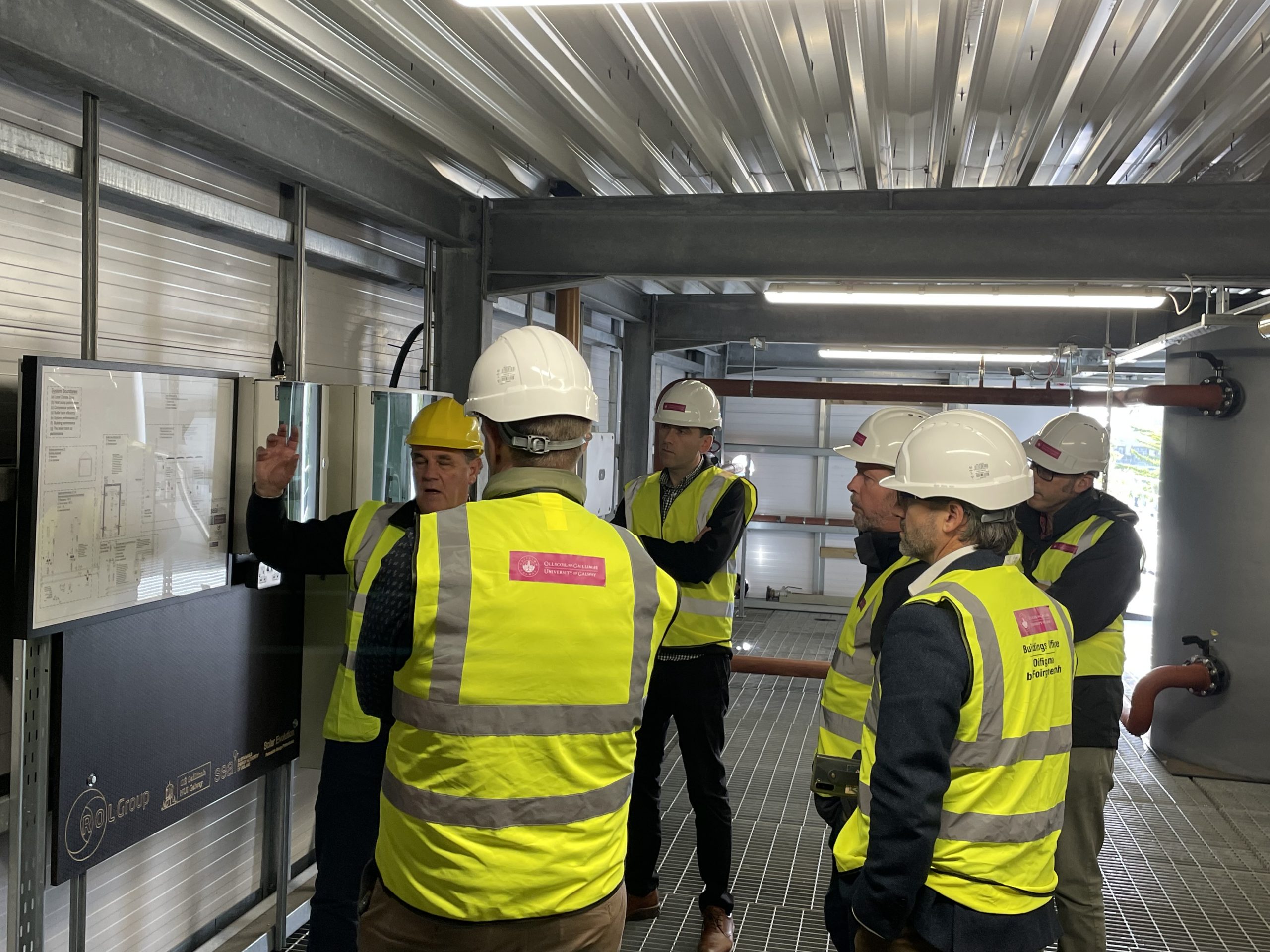
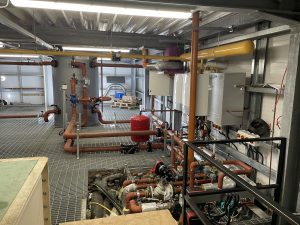
As part of the H2020 GEOFIT project, which focuses on innovative geothermal retrofit solutions, the new geothermal heat pump (GHP) will be installed in the Alice Perry Building, and will be connected to a closed-loop vertical ground source heat exchanger (GSHE). This will extend to the Kingfisher Club, with the heat generated heating the 25 metre swimming pool.
The main focus for quarter 1 in 2023 will be the launch of the University of Galway Climate Action Roadmap as part of the Energy Expo on 13th/14th January held on campus, bringing together a network of Energy professionals, suppliers, installers and researchers. The roadmap will set out how the University will deliver the targets by 2030 set out in the Climate Action Plan 2023.
As 2022 draws to a close and we look to the future, University of Galway, through the efforts of our staff members, researchers, and students, will continue to play its part learning, living and the transition to a sustainable future.